#the rat piper
Explore tagged Tumblr posts
Text
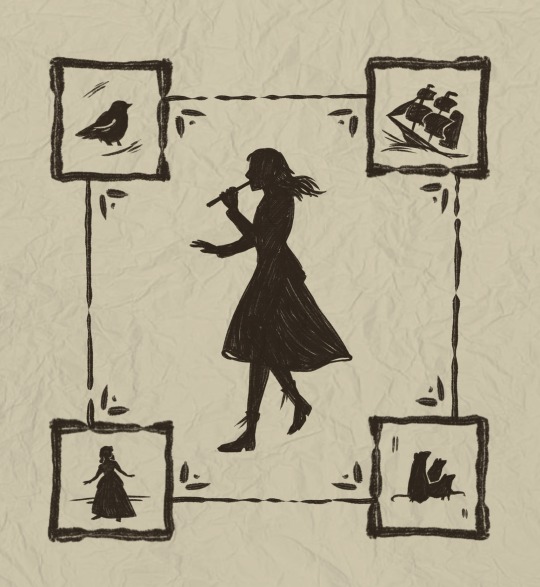
it's the time of year again for another original spooky story... and thus we present to you:
"THE RAT PIPER"
“…..Now, all you who’re here, what story would you hear? Shall I tell you the tale of the boy who taught himself to speak to bees? The story of the sailor who won a mermaid’s heart? The story of the old inn and the ghostly hand?” The storyteller looked down at the children surrounding them and watched as they clamored, each cheering for a different old favorite out of all her tales. She smiled, teeth still bright in a worn, warm, age-freckled face.
“Oh, but those are far too often told, I think. I’ve another story, just right for a winter night like this one…”
“A new story?” asked one of the children, his eyes wide with hope.
“In that you have not yet heard it told, it’s new. But I shall begin first off by telling you just how old this story is.” The storyteller nodded to the boy, and began her tale….
——
Listen. There was, and there wasn’t, and there was a girl called Tamsen, and she was a child of only a few more years than you back when your grandfathers were young. She was a piper’s daughter, and went with him when he traveled to play the flute and the fife at betrothals and weddings and dances and sometimes funerals, for some people like that sort of music for a dirge. When her father was not piping away at music that would make trees shake their leaves just as you nod your head and clap your hands, Tamsen played the flutes as well, and even what she piped on an old tin whistle felt like a song that might make a forest lift up its roots and dance.
But Tamsen was a hungry-hearted girl, as many children are, and the space between her father’s notes never seemed enough to please her. So off into the woods she went, when the work of the day was done, and on the battered whistle her father had used as a boy, she played his songs and her own for no one but the forest. Or, so she thought.
The woods have a way of knowing when someone is wanting, and cascading through the branches above and the roots below and in every network of the forest, the song of such a hungry heart traveled far and wide. And something that had been waiting a terribly long time for such a tune to be played heard, and oh, how quickly he came skittering.
In that clearing in the forest where Tamsen went to whistle, a stump of an ancient tree served well enough to stand on. It was cracked across in places, all hollow beneath where its roots once had fed deeply from the earth of those woods. And up from one of the cracks came clambering a man barely the height of Tamsen’s two hands put together. He scrambled to stand a little in front of her on the stump, expression sour as he dusted splinters of wood from his fox-red hair and long blue coat.
Tamsen looked down at him with more curiosity than apprehension at first, cataloguing him as if she could manage to fit him into any notions she’d had before of the sort of creatures that might dwell someplace underneath a tree stump. The little man had a sharp face like a weasel’s and a pointed beard, and bright, clever eyes like a pair of polished silver buttons, which looked back at Tamsen with just as little worry as she’d felt. Tamsen, being a rather over-bold girl at the best of times, reached out and grabbed at the back of his coat, hoisting him up to her eye level.
“What the hell are you?” said Tamsen, holding out the little man in front of her at arms’ length.
“Do you kiss your grandmother with that mouth, tall girl?” said he, smiling like a knife blade.
“My grandmother lives two villages past the edge of the forest, and I only see her when my father is there to pipe at a betrothal or a wedding or a dance or a funeral, for some people like that sort of music for a dirge, and even then, I don’t kiss her at all, with this mouth or any other. What’s more, I don’t see what you mean, talking of grandmothers when I asked a question of you.”
The little man crossed his arms and pouted, kicking his feet in the air as if to emphasize his point.
“If we’re aiming for politeness now, one ought not to shake their acquaintances about like sacks of potatoes!”
“Oh. My name is Tamsen. How do you do?” she asked, and as she made her clumsy, father-taught bow, she made the mistake you must never make if you happen to be a character in a story. She gave her name to a creature of a sort she did not know, and so swung open a door to a place she had never intended to visit.
“Gannet will do for now, if you must call me something,” said the little man. That was not his name, of course — the sort of thing that he was did not have names as we know them to be, but we shall call him that as we tell the story. We are not that sort of thing, and we are fond of names. Now, we shall go on with exactly what he was doing, and the sort of power he liked to offer.
Gannet held up an ivory whistle, as long as he was tall, and Tamsen took it. It was carved all over with animals, long and twisting and tangling tails and legs together in a marvelous woven pattern.
“Now, tall girl, that’s no flute for betrothals and weddings and dances and funerals, even though it can play the right sort of music for a dirge. Play it just right, and you can pipe down a thunderstorm that will rain so long and hard that the mountains themselves will be washed away.”
Tamsen raised the whistle to her lips and blew, a note as sweet as coming inside from the cold, as sharp as an autumn wind all braided with dry leaves.
“Why did you give this to me, just like that? I haven’t got any money, I can’t give you anything in trade for it.”
“The whistle must be played, tall girl! And I cannot do it myself,” said the little man, pointing out his height with a sweeping gesture of one hand. “You’ve got the music to play it properly, so play it you must! Now, a tune, if you would, and we shall see who comes to dance.”
She played again, a song quick and merry as any young person running to visit their lover, and the wind came up and sang along with a voice all its own. The little man shivered within his coat, for the day was cold, and with a rush of wings, a thousand birds slalomed through the trees and spiraled around them. Tamsen gasped, nearly dropping the whistle, and the whirlwind of wings slowed.
“Tall girl, it’s you who’s called them up! Play on, they want their dance!”
Tamsen, you know, had a piper’s soul, and all the cleverness in her little finger that most have in all their body. So up she stepped, and making the same bow and scrape that her father made before he played, whistled up a song for the birds to dance to.
Scarlet and ash, black and white, a swirl of feathers patterned out a dance Tamsen knew. This song was a courting song, the sort played when the young folk just grown-up enough to be thinking of sweethearts would be dancing the night away. Tamsen had often stayed up to see them, and now, found the beating of wings and the fluff of feathers just as marvelous as the tapping of boots and the swish of skirts as the couples joined and turned and parted. For as long as she played, the birds danced for the two watchers in the clearing, and just as the song ended and Tamsen lowered the whistle from her lips, they were gone again in a flurry of color. She stared after them, breathless with awe, the surging pride at what she’d wrought filling her from the soles of her boots to the tip of her nose.
“With a talent like yours, no doubt you’ll find fortune in no time!” said the little man, bright and self-assured. Tamsen considered for a moment. She was the sort to like being petted and praised a good deal, and she got little enough of that as it was.
“How exactly might one go about doing that?”
“Well, say you were to set out on your own, see a little of the world, have a try at finding out just what that whistle there can do. And I’d come along of you, of course, for on one hand I should very much like to see you try your paces and on the other I have rather an interest in finding out some fortune for myself as well.” Now, to Tamsen’s mind, that sounded just the sort of thing she should like to do, and her hungry heart, which had begun rather to gnaw at the inside of her ribcage, bit a little harder in her chest as if to say “yes, yes!” But a bit of her father’s instruction beyond the methods of the music had worn on her, though not enough to keep her home.
“I’ll get my coat, then, for I’m not supposed to go far off without it. And then we shall go a-fortune-seeking!” And off she ran back to the little house where her father the piper dwelt, slamming into the front-room as brisk as the autumn wind. Tamsen took her coat from the hook by the door, put a loaf of bread in its pocket, and laced her boots up tight once more, for one bootlace had come a little loose in running.
“Pa, I’m leaving to seek my fortune!” she called, for her father was beside the hearth in his usual chair, not quite expecting her to be home or to be away.
“You’re doing what now, Tam?”
“Leaving to seek my fortune! Tell Grandma I love her! Bye!” And with that, she stepped out the door and back into the wind.
“What took you so long?” said the little man, who had been waiting at the hollow tree until she returned.
“I was hardly five minutes.”
“Well, everything’s slower when you’re small. Slower to get from place to place, slower to get attention…”
“What if I carried you, then? If we’re traveling together, it would be better if you could keep up.”
The little man paced back and forth, considering.
“Fine, then, but carry me careful. I am more fragile than you think.” Tamsen snatched him up by the collar and set him on her shoulder. “Not so rough, tall girl!” He wavered, wobbling, for a moment, then got a hand around the shoulder seam of her coat and held on tight.
“Onward!” said Tamsen, and off she went, running along the path with the wind at her back and the little man clinging to her shoulder like a rat to a railing. After a few minutes, she paused and turned to him. “Where exactly are we going?”
“Over the edge of the world and back again, even to the deep waters below where Chance and Luck swim like fish in a fishbowl. But you know the stories well, tall girl! Bold knights and brave ladies must quest first before they find where Fortune dwells.”
“That’s all?” said Tamsen, and gave a little hop and skip that made the man squeak with surprise.
“Of course not! We shall meet with adventure and you shall play the whistle for a betrothal and a wedding and a dance and a funeral, and you shall play the whistle for Fortune itself and see what comes of it!” And so they went, and the sun turned about the sky as it spun hand in hand with the moon, and the road passed beneath Tamsen’s feet as easily as the notes of the tune she played as she walked.
But before too long had passed, she came to a fork of the path, and what had been the road that led from the wood now was two, one that led down to the water and the other to the town. Down the road that led to the town, the miller’s daughter and the smith’s daughter were walking arm in arm, the smith’s daughter smart in her blue Sunday coat and fine silk cravat, and the miller’s daughter with her white petticoat all showing where the hems of her faded skirts came short. They saw Tamsen as soon as Tamsen saw them, though Gannet had seen them earlier and yet said nothing.
“Where are you going, little girl?” said the miller’s daughter, looking down the length of her nose at Tamsen.
“I’m not a little girl, I’m a piper!” said Tamsen in return, with a sharpness she regretted.
“She’s the piper’s daughter, that she is,” said the smith’s daughter, “and I’m sure she is as good a piper as ever her father has been. He played at my father’s marriage, you know."
“I’m a better piper than ever my father will be,” said Tamsen, sour and eager to defend herself, and behind her braid, Gannet laughed a little laugh to himself. “I can whistle down the birds from the trees and the rain from the mountains, so I can!” And she spun the ivory whistle between her fingers as her father had taught her, and made it shine so that every carved creature all down the length of it seemed to twist and dance in the last of the sunset’s light.
“Sing me a dress, then, Tamsen?” asked the miller’s daughter, then, with a little hope behind her haughtiness, and smoothed down the faded front of her skirts where water and wear had half washed the print from the calico.
“Well, it may not keep you warm, but I shall see what I can whistle up for you.” Tamsen blew the whistle, and remembered a song that her father had played at a dance, years and years before. It was a rollicking, rambling song, and her fingers flickered up and down the flute and made the tune ring out, just as bright as ever it had been. The wind came up, and whirled a gown of fallen red maple leaves, weaving stems and vines into a trim bodice and a wide skirt.
“Tall girl, don’t dawdle! Fortune’s waiting, come along!” Gannet tugged on one of her braids, and Tamsen turned and put away the whistle.
“Won’t you come with us instead and go dancing?” asked the miller’s daughter, plucking at her crackling-bright hems, her smile shy but just as bright.
“Let her go her own way, my apple,” said the smith’s daughter, and took her by the hand.
“I’m going to find my Fortune,” said Tamsen, “and perhaps I’ll come back some other day when I’ve got it in my hand.”
“You can’t just go around saying such things out loud!” said Gannet, half-offended, into her ear. His breath was very cold, and Tamsen shivered as though the wind had crept in and laid its cold fingers all along the edge of her cap. But she ignored him, and, standing up on her tiptoes, tucked a last bright leaf into the smith’s daughter’s buttonhole.
“There. Now you match, and may be on your way, and we will be on ours.” The smith’s daughter grinned and bowed, and the miller’s daughter curtsied, and Tamsen made her bow in return before they parted ways. Down the road to the river they went, Tamsen with her heart light and Gannet’s fingers clutching at her collar, and the whistle at her mouth all the way. As it had not been a long way from home to the turning of the road, it was not far to go to reach the water, and Tamsen was glad of it, for she had begun to tire of running, for all that the road to the place where Fortune dwelt seemed to be a smooth one indeed.
“This way, tall girl!” said Gannet, all sprightly and sharp, and pointed down the hill and out toward the broad horizon. The water lay out before them both, wide and dark and as smooth as the road had been, but Tamsen could not run down the current of it as she had run down the road, and beneath her coat, a shiver stroked her spine at the sight of it.
“I haven’t money for the ferry,” said Tamsen, in an attempt at practicality, and Gannet scoffed.
“Show them what you can do, and there’ll be reward in it for the both of us!” So down to the docks Tamsen skipped, and halted just before the ferry.
“I can play for my passage,” said Tamsen, drawing herself up as tall as she could. Gannet made a fierce face. The boatman smiled slow, and the boy perched near the prow put out a tar-smudged hand and hauled the two of them over the side.
“Would you whistle us a wind, lass?” asked the boatman, pointing to the whistle in her hand. Tamsen nodded, and played a shanty that spun up the waves to whiteness and sounded like a seagull’s call.
“I know this one!” said the boy, grabbing at Tamsen’s sleeve. “Do you know the words to it, miss?”
“No,” said Tamsen, setting down the whistle as the wind went on. “My father taught me the tune of it, but I’ve never heard it sung. Has it got a story to it?”
“It ends unhappy,” said the boy.
“Lots of songs do,” said Gannet, smiling sharp as ferrets’ teeth.
“Aye, but some don’t. Why don’t you play a happy song, the kind where everyone ends up all right at the end and they have a feast?”
“Feasts are a tricky thing too, lad. Oh, when you’re serving up and it comes time to carve in, you never do know just what’s on your plate. Meat’s messy, and it goes rotten quick as false-told tales. Better dry bones for me, strong and simple just as songs are.” Gannet snapped his teeth and smirked, and the boy shivered away and didn’t speak to them again, although Tamsen could always see him just at the edge of her vision, keeping a fixed look on Gannet out of the corner of his eye.
The boy did not speak to Tamsen or Gannet again, and his father did no more than smile softly as Tamsen played the last sweet chorus of the song, but sang the verse that told of sorrowful shipwreck, and the king’s fair bride dead before she ever was married, and all the captain’s bravery come to nothing. But though the shanty that Tamsen had chosen was no story of a smooth sail, they came to the other side of the water in good time, and the boatman wished them well as they went on their way, but the boy said nothing, and Tamsen clambered down alone.
And now that the further shore of the water lay before them, there was nothing else for Tamsen to do but to walk, and to play the whistle, and to walk again. To another town they came, larger than any one that Tamsen had ever seen, and so it was nervously that she passed the slow-swinging gates and into the empty avenues within.
“Where is everyone?” she wondered, but there seemed to be no one else but Gannet to hear her, and no sound but the padding of her own footsteps. That, and something more. A rustling, a skittering, a scratch-of-nails-on-slate sound, coming from everywhere at once. Tamsen spun, and saw a crooked shutter swing out on its half-rusted hinge, the wind picking at paint gone cracked and peeling with heat and sun and the fingernails of time. Her feet felt unsteady on the cobblestones, and scraps of paper and sackcloth blew about before her.
Tamsen knelt, plucking a bit of paper from the ground, the back of it dark and yellowed where glue had gone long dry. It was a label, but the writing of it was a mystery to her, for the paper seemed to have been chewed half out of existence by a myriad of tiny pointed teeth.
“Gannet, do you—“ she asked, the wind clawing at her coat and rolling dust over the toes of her boots, but before she could finish, Gannet shrieked “Tall girl, here!” and she snapped upright as if tugged by a marionette-string. Now the cobbles were all too solid, though Tamsen wished that they were not, for down through the windows and out through holes in the plasterwork and from every crevice of those long-left houses came a flood of rats, skittering and scuttling so that the streets rang with the sound of their claws all a-scrape against stone. Rustle and scratch and down came rats from roofs of moldering thatch, creak and squeak and clatter and out came rats from the cracks between boarded-over doors. Tails twined together in a wriggling mass of scaled skin, mangy fur showing through the spaces in between.
Tamsen put the whistle to her mouth, the instinct to do so as quick as a lightning-bolt and just as snapping-bright, but her fingers were frozen, and everywhere around them the rats were running. Gannet got a foothold in her braid, and climbed atop her cap, his sharp little fingers digging into her scalp, and Tamsen nearly shouted with the start of it, for his hands were clay-cold in the sun of that town that had been left to the rats.
“I don’t know what song to play!”
“Whistle, tall girl! You’ll know!” And so Tamsen placed her fingers on the whistle and played, and the rats rose like a river. They flowed up out of gutters and drains, poured out of windows and doors, scampered in a tidal wave of skittering feet and piebald fur. Gannet slipped down, but clung to Tamsen’s coat collar, pressing himself up against her neck with all his strength. All around Tamsen’s feet, the rats swirled and spiraled, dancing to her tune. She breathed in, and played faster and louder than before, and stepped up, up onto the backs of the rats, dancing with them light as leaves.
“Tall girl, have you lost your mind?” Gannet grabbed hold of her hair with sharp little fingers, but Tamsen only laughed into the whistle and played on.
“They’ll take us to find Fortune!” And the rats did, cascading along under Tamsen’s feet as she strolled along their backs. Rats can run a long time, if they’re caught up in such a thing as music. And human children can run a good long while, just the same. They’re not so fragile as one might think, both children and rats, though their bones are more brittle and their bodies smaller.
And so the day turned to night, and to day again, and the rats ran on, and Tamsen played the ivory whistle far past the point where she’d have gasped for breath before. But something new and wild had come up like the wind now, in her lungs and in her mouth, and over and over she played that song that told of lost loves and the fading ends of summertimes and bright beauties faded.
At last the rats slowed, for the town was long gone by, and the forest had faded first into chaparral, and then to plain, and then to nothing but sheer white stone, marked with deep and gaping cracks. Just as quick as they had come up from the houses and the holes, the rats scuttled down between the stones, and hardly before she knew it, Tamsen was all but alone again. The last notes of the song rang hollow on the empty air, and she looked to Gannet, questioning.
“What am I to do now?”
“Why, play on, tall girl! What else?”
“And Fortune?”
“The whistle must be played, the year must spin! With summer’s end, the piper calls the harvest in! There are to be dances, and betrothals, and weddings, but in the autumn must the funerals be held.”
“What—“
“You’ve had your betrothal and your wedding and your dance and your funeral, and now it’s time to play your dirge. Party’s over, tall girl.” The man crossed his arms, his face skeletal, his teeth sharp. There was an odd light to his eyes, once which Tamsen had rarely seen before. He clawed his way back to her shoulder, and though she tried to shake him free, he only dug his sharp fingers the more fiercely into her coat-sleeve. As he spoke again, he was right against her ear, shrill and demanding.
“Now, play the whistle, play it well! Pipe me one last tune!”
And Tamsen put the whistle to her lips and played a song her father had played after nearly every funeral. Not mournful, and something you danced to, to be certain, but slower, softer, the song the coffin-bearers might walk in step with as to the grave they went. The last song of all.
The wind came up, and the ground shook beneath her feet. Tamsen nearly lost her balance, and felt Gannet’s sharp hands grab at the back of her neck as he slipped off her shoulder.
The stones cracked and split, heaving up to reveal deep chasms beneath. Tamsen clambered to perch atop a spar of rock, missing a few notes as she played one-handed. And up out of the earth came the dead, dressed in bones clean and clattering, and danced. First a cascade of birds, somehow still flying despite their wing feathers having long rotted away, then people, of all ages, bones rattling as they stepped from foot to skeletal foot. Tamsen noticed one skeleton missing a leg, others with cracked-in skulls or fractured rib-cages, though it seemed not to impair them as they dipped and turned. Watching the dead in their dance from her place atop the jutting stone, she began to recognize familiar movements, familiar steps, though all danced to the same tune. Some made the box-step of a hornpipe, while others twirled their partners back and forth, skeleton after skeleton rising up to join the swirling rings of dancers.
Then, last of all, a new tide of bones, smaller than the rest, shook from the earth and solidified, scampering underfoot. A hundred million skeletons of rats, their bones bleached and shined, their tiny toe-bones skittering and clicking on the stone.
“You made this place.” The certainty settled on Tamsen’s shoulders like a pall, heavier yet than Gannet’s weight on her shoulder. “You’re not Fortune, are you.”
“Oh, but I am, tall girl! Fortune’s as much me as it is anything else, you see. There’s a fortune that’s your luck, and a fortune that’s your fate, and a fortune last of all, that is your death. The world turns, tall girl, and Fortune turns it, but my hands are small, small! I cannot gnaw through the threads of life all on my lane!”
“And exactly what is it you do, then?” Tamsen’s sharpness served her well, even as Gannet preened and smirked so near to her ear.
“Every year I take one, a clever tall girl or a bright tall laddie, no matter who so long as they can play. And every year they play the flute, and down at Fortune’s hands they go to clay.”
“It’s them, isn’t it?” Tamsen asked, but the certainty of the truth was already on her lips. Gannet only smiled, and she played on. The music came harder and faster and sputtered and crackled in her lungs, and her fingers moved so that she feared they might slip from their sockets entirely. If she did as Gannet asked of her, she’d die here too, and the next year, her skeleton would be among the dancers. But the music had her in its grip, Fortune had its hand wrapped tight around her shoulders and— and she was the piper. She called the dance with her tune, left right left right, hop and step and cross and back with every note. And just as she had begun it, Tamsen could end it.
She took a deep breath. Then Tamsen dropped the whistle from her mouth. The dance went on without her playing, the rattle and clatter of the skeletons keeping time in perfect morbid percussion. Tamsen watched for a moment, ignoring Gannet as he tugged at her hair and shouted at her to keep playing. She got a hold on either end of the whistle, then, and brought it down on her knee. It snapped in two with a crack, and every empty-eyed skull out of all the dancing dead turned to look at her.
The house of Fortune went silent. Not a clatter or a creak of bones, just a thousand empty sockets pointed like eyes, and Tamsen, her face set, staring back. Gannet, still clinging to her coat, shrieked, more shrill and piercing than the whistle had ever been. The world seemed to shiver under the weight of such a sound as that.
Tamsen reached up and caught him by the coat collar, and ripped him from her shoulder. He dangled from her hand, limp, eyes shut tight. Then he opened his eyes, steely-silver, and then, as if he had opened another set of eyes, somewhere else, he was gone, and Tamsen’s hands were empty. She let out a long breath that she hardly realized that she had been holding, and the silence broke, too, as she dropped the shards of the whistle to the ground. A clatter and a crack, and all the twisting and twining of the carved ivory creatures was no more movement than the wind blowing low over the drought-cracked ground.
The wind came up, catching at her coat-sleeves and her braids, and the skeletons turned to one another, looking lost. Tamsen watched them stumble about, then put her hands to her mouth and shouted.
“Go home!” The skeletons turned to face her again. “You found your fortune, all of you, didn’t you? Your families are waiting for you back in the world — go there! I think…” and at that, her confidence slipped a little, her voice half a whisper. “I think they miss you.”
Then, gaining confidence again— “What are you waiting for! Go!” Tamsen stared, standing, panting, and a hundred pairs of empty eye sockets stared back. The foremost of the skeletons cocked its head to one side, as if in confusion, and turned to its fellows, gesturing wordlessly. There were a few sharper cracks amid the general clatter, as of bones being hastily snapped, and when the spokesman turned back to Tamsen, it had in its hand a long leg-bone, all drilled with holes to make a flute.
“Oh,” said Tamsen, all the air knocked from her lungs. “Oh.” She took the flute carefully from the bony hand that held it — bowed over that hand as best she could as she did so. The skeleton, though it always had shown its teeth, seemed to grin at the prospect.
“…I’ll give you a dance for the way home, if you’ll have me.” Tamsen said the words very quietly, but the skeleton appeared to hear her, and curtsied, knee-bones clattering. And so she placed the flute of bone to her lips and blew, and the wind stayed where it was, but Tamsen was a piper down to the hungry heart of her, and all the wind she needed to dance the rest of the way was the breath curling in her lungs.
——
“And what happened to Tamsen afterwards?”
“Well, friends, this story is over, you see. The tale is done, the mouse has run, and whoever catches it shall make themself a fur hat out of it. That is the way of the world. But perhaps, if you are good and quiet, I’ll spin another story and show you the weaving of it.”
#em writes stuff#oc time again hehe#the rat piper#HAPPY HALLOWEEN LADS I'VE BEEN WORKING ON THIS ONE FOR TWO YEARS#and the cover art? well it is from two years ago when I started writing it. but What of It. go! read!
77 notes
·
View notes
Text
I love the Lost Trio bc you’ve got Piper, who grew up with immense wealth and fame and could have everything she ever wanted, Jason, who was revered for his parentage, looked up to and respected as a leader and even raised aloft on a golden shield and proclaimed Praetor, and then you’ve got Leo, who lived under a bridge and had to fight off racoons for leftovers in dumpsters.
#i need to see more street kid Leo#bc it’s just two private school kids with famous dads and this tiny feral street rat they adopted#the lost trio#the lost hero#leo valdez#leo pjo#leo valdez pjo#all da ladies luv leo#leo valdez angst#leo valdez hc#leo valdez headcanons#leovaldez#pjo leo#team leo#jason grace#pjo jason grace#jason pjo#pjo jason#jason grace pjo#jason hoo#jason grace hoo#piper mclean#piper pjo#pjo piper#piper hoo#percy jackson#pjo fandom#pjo#percy jackson fandom#pjo hoo toa
1K notes
·
View notes
Text

#fallout 4#fallout#fallout companions#fallout cait#fallout piper#piper wright#fallout maccready#robert joseph maccready#rj maccready#i WOULD call him rob if i didnt hate my uncle#but i do call him macncheesy#my lil rat man#fo4#fo4 companions#fallout memes
291 notes
·
View notes
Text
This makes so much sense why Kipperlilly was asking about how Kristen made Yes! And specifically Where she made Yes! at.
Kristen made a whole new Deity through Arthur Augfort's office and school. As a powerful cleric she reached into the Astral Plane and made life out of her questioning and worship. She temporarily had access to the realm of dead gods to make something from nothing. This was all set in the making from day one.
Jace was working with Kalina and Arianwen to revive The Nightmare King and The Rage Goddess. That's what Ragh saw in front of the office after Prompocolypse. They used Kalvaxis wanting to regain his power as a bigger play to bring back their corrupted and dead deities. A chess piece in a series of steps.
While Kalina was going to bring back The Nightmare King, Jace would work on bringing back The Rage Goddess through Elmville. Kristen already proved that Augefort Academy has access to the Astral Plane. He found and targeted students susceptible to rage, took them to the Mountains of Chaos where the Divine Wedding took place and force the students to make a choice: live for Rage or stay dead.
The Rat Grinders made that choice except for Lucy. Which is a problem because the Need a Cleric. The people the Rat Grinders killed from the school have been Clerics, because with Kristen's method you need a powerful connection to a Deity and Worship to bring life to one.
Lucy worshiped a Giant Goddess, she would have been perfect but she refused.
Yolanda gave up any affiliation to a specific deity, neutral but powerful in worship. She would be a worthy vessel but she refused.
Buddy was brought to always be killed. A follower of Helio, the son of Sol who had corrupted the Goddesses in the first place. He is the grandson of a powerful Cleric, and has that same connection and power within himself. Kipperlilly didn't kill Buddy in panic, that was the plan all along: bypass Obliviti Mori by killing a cleric to meet the Rage Goddess in the Astral Plane, then revive them to spread the word and start the ritual. Buddy was just the first one to accept.
Like in Sylvaire, they are seeding Rage to make their own version of the Nightmare Forest to bring back The Rage Goddess. It's going to bloom and spread, rake over Elmville and the Augefort Academy where the Astral Connection is.
These plans have been started since Freshman Year, and have been defeated all because on goblin was just trying to find his babysitter and another halfling just couldn't handle that.
#lowkey also thats why the rat grinders didnt want Lucy to revive the rats#they need the rats#to spread the rat plague of rage#reverse pied piper#have to save Rat World now#d20 fantasy high#fantasy high junior year#d20 fhjy#fhjy#fhjy spoilers#dimension 20 junior year#junior year spoilers#fantasy high spoilers#fantasy high junior year spoilers#dimension 20#my response#the real question is#how long was Jace serving#thats why hes a sorcerer#since he doesnt really teach classes he has the free time for evil#fig was sussing the wrong teacher that day#rat grinders#jace stardiamond#lucy frostblade#yolanda badgood#buddy dawn#kipperlilly copperkettle#kristen applebees#ankarna#the nightmare king
163 notes
·
View notes
Text

trans! the whole family!

bi! the whole family!

help! this whole trans family!

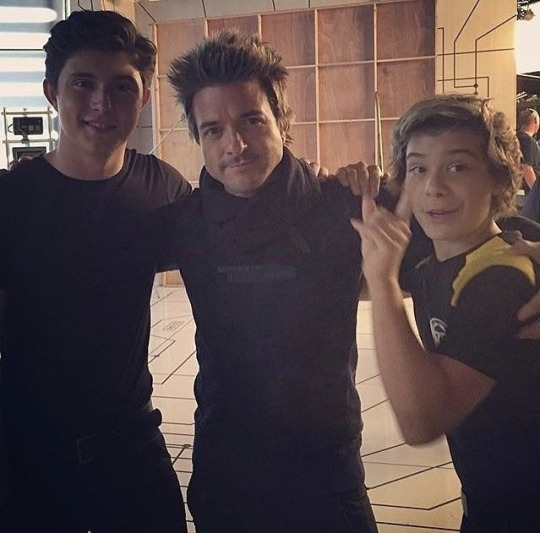
nevermind! HELP! this whole queer family!
#the villains of valley view#henry danger#the thundermans#lab rats#vic madden#eva madden#amy madden#jake madden#colby madden#kris hart#jake hart#piper hart#henry hart#hank thunderman#barb thunderman#phoebe thunderman#max thunderman#max design pro 😂😂😂. sorru#billy thunderman#nora thunderman#donald davenport#douglas davenport#tasha davenport#tasha dooley#adam davenport#bree davenport#chase davenport#leo dooley#marcus davenport#daniel davenport
78 notes
·
View notes
Text
I was re reading a bit and looking back camp half blood DEFINITELY has some sort of hazing going on.
Cause you look at characters like Percy and Piper and start to wonder.
Like, a LOT of people forget, but Percy was NOT well liked when he got to camp. He was the newbie, unclaimed, AND he was getting attention because he killed the Minotaur. Clarisse wasn’t the only one out to get him. It took Percy until the third book to get the reputation that he as with the campers because they didn’t like him.
He was mocked for everything, for being a new kid, for not knowing anything, for killing the Minotaur, for being a child of the big three.
And you have to realize that outside of the big three thing, they were ALL in his shoes before. So it’s almost nonsensical for them to give him a hard time. Unless it’s a type of hazing.
This behavior is never brought up again but it’s actually one of the reasons Percy likes Luke so much in the first book. Outside of Chiron and Grover, Luke was the only one being nice to him.
Because he was being HAZED.
And it would’ve been a one time thing but I think each Cabin has there own niche of hazing because you then get Piper and get a look into the Aphrodite cabin.
Firstly, you have to break someone’s heart in order to be accepted, weird. You have to do everything Drew says or else your on cleaning duty or want to wake up in the middle of the lake or smth. And your start at the bottom of the pack before working your way up by becoming one of Drew’s minions. It’s like every stereotypical sorority film.
There’s also the fact that it’s mandatory that you get robbed when you first stay in the Hermes cabin, need to get glory in order to STOP being bullied, and kiss a boar when you first get to camp (deleted chapter)
Like throughout the series, I think the only people we don’t see go through this are the Zeus kids (privilege), Annabeth (seasoned camper) and Leo (nice siblings).
And like Nico kept leaving because he thought no one liked him because he was a Hades kid. So imagine if, no, it wasn’t being he was a Hades kid, he was just getting the mandatory hazing. Like he thought everyone hated him but they were just fucking with him the whole time.
But yeah, CHB definitely hazes people.
#I love how bitchy Rick made this camp omg#and it’s like an actual camp!#like yes drown the new guy in the toilets#get the new girl to break someone’s heart omg that’s awesome#convince the 10 years old we all hate him#okay maybe not so awesome#but I am happy this was sorta included#also new rome#everyone forgets one of their punishments#is being put in a bag with rats#that’s CRAZY#also I talked abt the Zeus kids not getting hazed#and they do kinda get privileges throughout the series that no one else gets#so the imagine of them being like rich kids that don’t get hazed because their rich#and everyone leaving them alone because their scared of the dad is so funny to me#percy jackon and the olympians#pjo series#pjo hoo toa#pjo tv show#heroes of olympus#pjo#percy jackson#annabeth chase#nico di angelo#piper mclean#camp half blood
40 notes
·
View notes
Text
y'all I found Hartley's perfect chess set



give the rat man
~rat chess~
32 notes
·
View notes
Text

The Piper for @cadaverkeys and a bunch of rats from different artist over on Artfight definitely having fun and not meeting terrible fates :)
#artfight#artfight 2024#piper#not my character#my art#digiital art#animated#laviis art tag#rat#rats#theres no children in hamelin#ill post more artfight art later on#also shay if you want this bigger i can do that also :D
53 notes
·
View notes
Text

ok I’m in his fandom
( @arohkin calls him Lorelai. suits perfectly)
28 notes
·
View notes
Text

Yeah!!!!!!
27 notes
·
View notes
Text

Oh Hartley
19 notes
·
View notes
Text
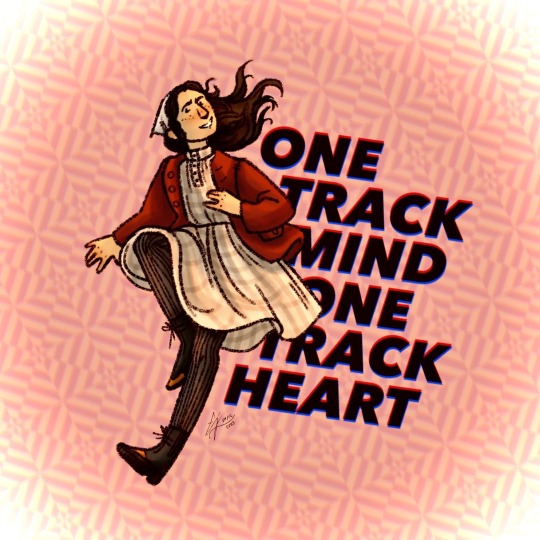
I KNOW EXACTLY WHAT I WANT AND WHO I WANT TO BE!
#em draws stuff#oc time again hehe#the rat piper#the piper: tamsen fairchild#if there ever was one to be soundtracked entirely by marina in a project about real folk music it is her!#just goofin about a little since my hands are not working and I do not feel so great about Art at the moment#which I hope is not a Sign about the rest of the Situation as it were. ah well so it goes.
24 notes
·
View notes
Text

18 notes
·
View notes
Text
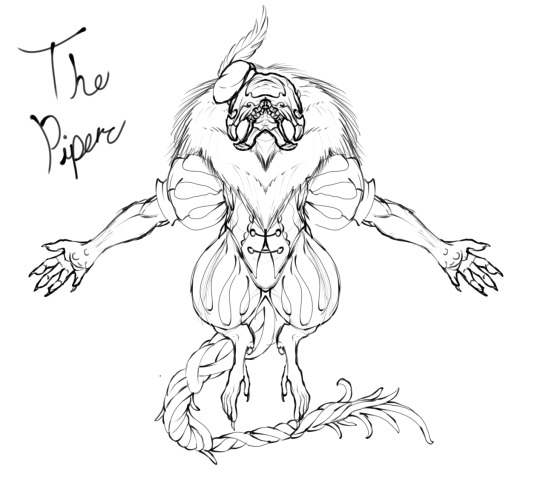
Custom Lethal Company Entity oc; The Piper, aka Ratking. inspired by the Ratking of the nutcracker, and the pied piper. He uses a flute to draw in assets, its music takes control of their bodies and drags them close enough to attack. An employee can break the spell by yelling louder than the music, disrupting it and causing the Piper to flee, or in a rare cases...attack the source of the disruption. Pipers have a knack for stealing anything of high value within the immediate area or off of corpses.
#lethal company#custom oc#my oc#rat king#pied piper#monster#i struggled with its design#but im fairly happy with how it looks
45 notes
·
View notes
Text

Inktober Day 11: Cursed
While the town of Tintervale was cursed to act out various fairy tales and folktales, Peter was cursed to play the Pied Piper. Even after he gets his mind back, the rats still follow him around.
#Peter#inktober#inktober day 11#inktober 2024#secretsataninktober#art#traditional art#artist#artists on tumblr#dnd#dnd character#dnd art#bard#triton#piper#pied piper#rats
8 notes
·
View notes
Text
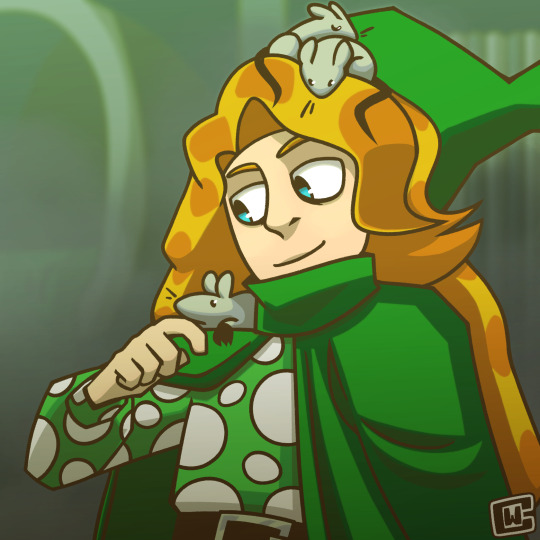
->Day 21<-
Pied Piper out there living the dream (friends with rats)
73 notes
·
View notes